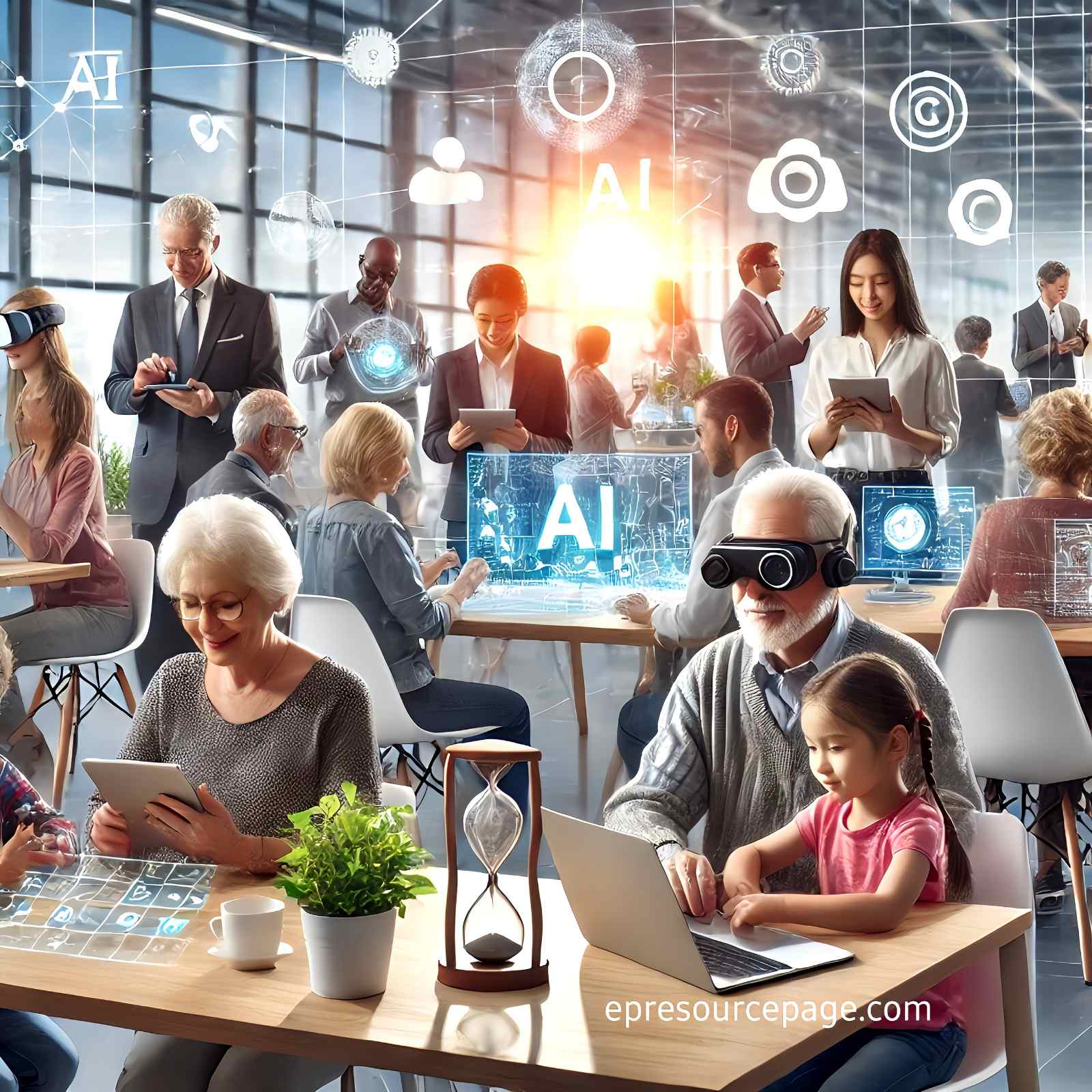Science & Technology
Bridging Generations with AI: How Humanity’s Next Frontier Includes Every Generation

Here is an image representing different generations engaging with AI technology, capturing a sense of unity across age groups in a futuristic yet realistic setting.
As we stand on the brink of a new era, artificial intelligence (AI) is becoming an integral part of our lives, redefining how we work, interact, and think about the future. While AI’s possibilities are exciting, its integration into society will have diverse implications for each generation—from those who witnessed the dawn of the computer age to those born into a world already immersed in AI. How we navigate this journey together can define whether AI becomes a force for unity or division.
Here, we explore the unique relationship each generation has with technology and AI, imagining a future where every age group can benefit, contribute, and grow in an AI-enhanced world.
1. The Silent Generation and Baby Boomers (born 1928-1964): Learning, Adapting, and Mentoring
Many from the Silent Generation and Baby Boomers grew up in a world where computers were the size of rooms, and smartphones were unimaginable. Yet, today, they are embracing tablets, smartphones, and social media, bridging generational gaps through technology. For these generations, AI offers tools that can improve quality of life, health, and independence. Consider advancements in healthcare AI that assist doctors in diagnosing diseases more accurately, or virtual assistants that help seniors manage medication schedules and stay socially connected.
These generations also have the invaluable role of providing mentorship. With decades of life experience, they can help shape AI’s ethical standards and teach younger generations about resilience, patience, and historical perspective. Their wisdom can serve as a moral compass, ensuring AI development aligns with humanity’s best interests.
Future Focus: AI training programs for seniors, social robots for companionship, and platforms for intergenerational knowledge sharing are promising paths for integrating older generations more deeply into the AI revolution.
2. Generation X (born 1965-1980): Balancing Skepticism and Pragmatism
Generation X grew up as independent “latchkey kids” who watched the world transition from analog to digital. Often skeptical of major societal shifts, they are also remarkably adaptable—a trait that will serve them well in the AI era. As the workforce generation currently in their prime, they face a unique challenge: adapting their careers and skills to accommodate AI's role while also preparing to lead businesses and organizations in an AI-integrated economy.Gen Xers are likely to drive conversations about the ethical use of AI, advocating for data privacy, job security, and transparency. Their skepticism is a vital counterbalance, pushing for responsible AI use that respects human privacy and dignity.
Future Focus: Personalized AI-driven upskilling programs, enhanced work-life balance tools, and platforms to champion ethical AI practices could empower Gen X to lead responsibly and keep pace with rapid technological shifts.
3. Millennials (Generation Y) (born 1981-1996): Socially Conscious Digital Natives
Millennials, who grew up alongside the internet, smartphones, and social media, are perhaps the most adaptable generation to new tech. For them, AI represents an exciting, albeit complex, potential for solving big problems—nvironmental issues, social injustices, and global health. Millennials expect AI to align with values of inclusivity and social justice. They are eager to use AI for good, whether through applications that support mental health, tools that help democratize education, or innovations that address climate change.
Yet, this generation is also mindful of the drawbacks. They understand that AI is a double-edged sword and are vocal about the risks of job displacement, bias in AI algorithms, and potential exploitation. Millennials will play a crucial role in shaping AI policies and developing socially responsible applications that prioritize inclusivity.
Future Focus: AI-driven initiatives in sustainability, mental health support platforms, and socially responsible technology incubators could empower Millennials to lead AI for the greater good.
4. Generation Z (born 1997-2012): The Digital Natives of the AI Age
For Generation Z, AI is part of everyday life. Many in this generation first encountered AI through virtual assistants like Siri or Google Assistant, algorithm-driven social media, and personalized content recommendations. They have a unique perspective on AI, often seeing it as a natural extension of technology rather than With a strong awareness of social and environmental issues, Gen Z is inclined to explore how AI can address pressing global challenges. They are also mindful of personal boundaries, data privacy, and mental health, making them advocates for responsible AI that respects user autonomy and avoids exploiting data for profit.
Future Focus: AI tools for climate action, ethical social media algorithms, and user-controlled data privacy settings will likely be crucial for Gen Z as they seek to balance personal empowerment with technological convenience.
5. Generation Alpha (born 2013-present): Shaping the Future with AI from Day One
The youngest generation, Generation Alpha, is growing up in a world where AI is embedded in every aspect of life. They will likely be the most AI-literate generation yet, with AI-enhanced education, interactive learning, and adaptive AI toys already shaping their development. For Gen Alpha, AI won’t just be a tool—it will be woven into the fabric of their learning, creativity, and social interactions.
However, there are challenges. Early exposure to AI could impact how they develop critical thinking and interpersonal skills. Society will need to guide their understanding of technology’s ethical dimensions, emphasizing the human role in shaping AI rather than being passively influenced by it.
Future Focus: Emphasis on human-centric AI in education, collaborative AI learning tools, and strong ethical frameworks will be essential in nurturing a generation that uses AI thoughtfully and responsibly.
Forging a Collaborative Future Across Generations
As we move forward, it’s essential to foster collaboration across generations. Each age group brings unique skills, experiences, and perspectives that can help shape AI into a force for good. The Silent Generation and Baby Boomers offer wisdom and historical perspective, Generation X brings adaptability and a pragmatic lens, Millennials contribute social consciousness and energy, Generation Z drives innovation with a critical eye, and Generation Alpha represents the limitless potential of human creativity shaped by technology.
Bridging generational divides in the AI age will require open dialogue, inclusive design, and a commitment to shared values. By considering the needs and contributions of each generation, we can create a world where AI enhances humanity rather than dividing it.
Ultimately, AI’s true power lies not in what it can do alone, but in how it can amplify the best of each generation. Together, we can build an AI-enhanced future that is inclusive, compassionate, and deeply human.
Further Reading: These resources offer comprehensive perspectives on AI’s integration into society, helping readers understand how different generations approach and benefit from this technological evolution.
1. "Artificial Intelligence and Life in 2030" - This report by Stanford University’s One Hundred Year Study on AI explores the societal impact of AI over the next decade, offering insights into the benefits and challenges for all generations.
Stanford AI Report
2. "Generational Perspectives on Artificial Intelligence" - This article explores how different generations perceive and adapt to AI, providing an understanding of generational attitudes toward new technologies.
Harvard Business Review
About the Author

Edwin Paña '69
Edwin O. Paña '69 is a multifaceted professional with a diverse academic foundation in Forestry and Business Administration. As a retired entrepreneur, he has successfully led multiple ventures throughout his career. In 2024, he was honored with the prestigious Tanglaw Award for Leadership, a testament to his dedicated service as Board Chairman of Upsilon Sigma Phi North America, Inc., where he contributed over a decade of impactful leadership.


